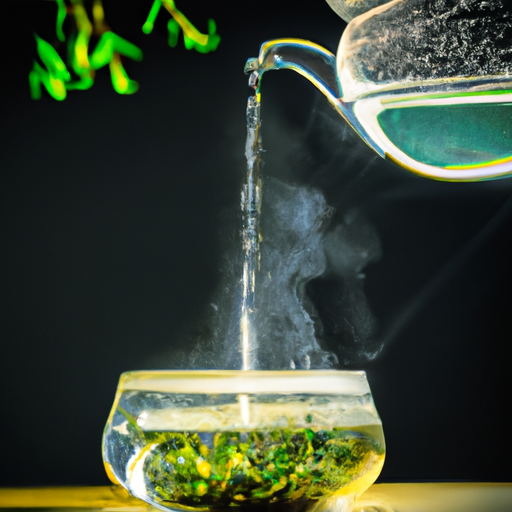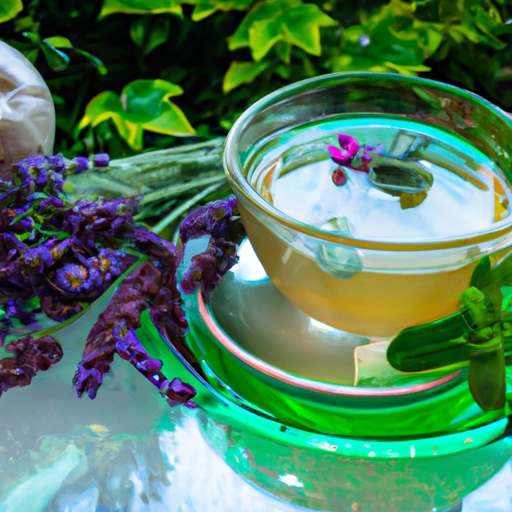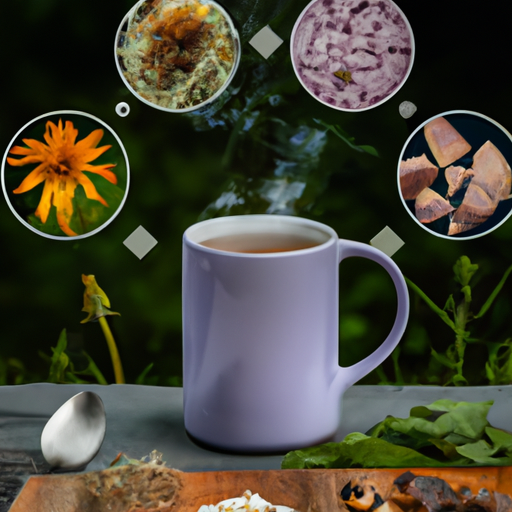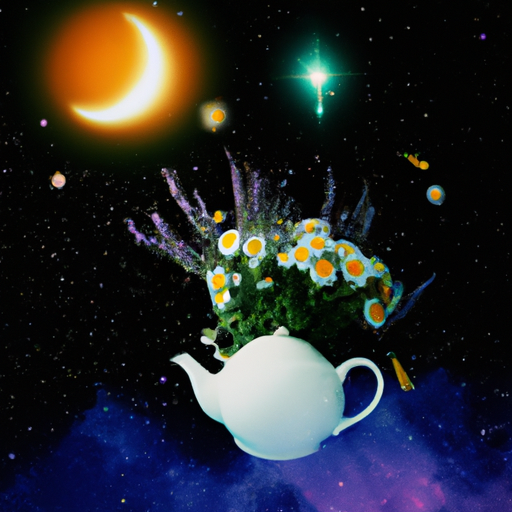Welcome to the world of herbal teas, where the power of plants and the purity of nature combine to offer a calming and rejuvenating experience. As a devoted herbal tea lover, I am thrilled to introduce you to the magic of these traditional brews that have stood the test of time.
Herbal teas, also known as tisanes, are infusion beverages made from the leaves, flowers, seeds, or roots of various plants. They offer a delightful alternative to traditional teas and are renowned for their therapeutic properties. From calming chamomile to invigorating peppermint, the range of herbal teas is as diverse as the plants they are derived from.
Discover the origins, types, and health benefits of herbal teas, and learn how to brew and serve them to perfection. Explore the art of blending different herbs to create unique and personalized tea blends. Unwind with herbal teas that promote stress relief and mental well-being, or embark on a cleansing journey with detoxifying herbal infusions.
Let us delve into the enchanting world of herbal teas and discover how they can enrich our daily routines and nurture our mind, body, and spirit.
Key Takeaways
- Herbal teas are infusion beverages made from plants and offer a delightful alternative to traditional teas.
- They have a rich history and were used in ancient civilizations for their healing properties.
- Herbal teas can boost the immune system, calm the mind and body, and support digestion.
- Creating your own herbal tea blends is a rewarding experience.
Origins of Herbal Teas
Herbal teas have a rich history, originating from ancient civilizations that harnessed the power of plants for their healing properties. The historical significance of herbal teas cannot be understated, as these natural concoctions were not only used for their health benefits but also played a vital role in cultural traditions.
Ancient Egyptians, for example, revered herbal teas and used them in religious rituals and ceremonies. In China, herbal teas were believed to balance the body’s energy and promote overall well-being. Similarly, Native American tribes incorporated herbal teas into their healing practices, relying on the wisdom of nature to treat various ailments.
Cultural traditions surrounding herbal teas vary across different regions and time periods. In some cultures, herbal teas were seen as a form of medicine, with specific plants being used to address specific health concerns. In others, herbal teas were enjoyed as a daily ritual, a way to connect with nature and find solace in its healing powers. Regardless of the cultural context, the use of herbal teas has always been deeply rooted in the belief that nature provides us with everything we need to live a healthy and balanced life.
As we delve into the world of herbal teas, it’s important to explore the different types and flavors that exist.
Types of Herbal Teas
Chamomile, known as the sunshine in a cup, offers a calming and soothing experience. This delicate, daisy-like flower has been used for centuries to create a delightful herbal tea that promotes relaxation and wellness.
Herbal teas are a wonderful way to enjoy the benefits of nature’s bounty while nurturing your body and mind.
There are various types of herbal teas, each with its own unique flavor and benefits. For those looking to unwind, chamomile is a popular choice due to its natural calming properties. Peppermint tea is invigorating and refreshing, perfect for a mid-afternoon pick-me-up. Lavender tea, with its gentle floral aroma, can help reduce stress and promote a restful night’s sleep. And if you’re seeking a burst of citrusy goodness, try a cup of lemon verbena tea.
Not only do herbal teas provide a delightful taste experience, but they also offer numerous health benefits. They’re packed with antioxidants, vitamins, and minerals that support overall well-being. Plus, herbal teas can be easily customized to suit your preferences and needs. From soothing blends for relaxation to invigorating recipes for an energy boost, the possibilities are endless.
As we explore the health benefits of herbal teas, you’ll discover how these natural remedies can enhance your wellness journey. So, let’s delve into the wonderful world of herbal teas and uncover the secrets they hold for our health and vitality.
Health Benefits of Herbal Teas
Indulging in a cup of chamomile or other herbal infusions can provide a range of health benefits that contribute to overall well-being. Herbal teas have been used for centuries in traditional medicine to support various aspects of health.
Here are three ways that herbal teas can promote wellness:
-
Boosting the immune system: Many herbal teas, such as echinacea and elderberry, contain antioxidants and vitamins that can help strengthen the immune system. Regular consumption of these teas may reduce the risk of common illnesses and promote a faster recovery.
-
Calming the mind and body: Herbal teas like chamomile, lavender, and lemon balm have soothing properties that can help reduce stress and anxiety. These teas are often used to promote relaxation and improve sleep quality.
-
Supporting digestion: Peppermint, ginger, and fennel teas are known for their digestive benefits. These herbal infusions can help relieve bloating, indigestion, and other gastrointestinal discomforts.
By incorporating herbal teas into your daily routine, you can tap into the natural healing properties of plants and experience the many health benefits they offer.
Transitioning into the next section, let’s explore the world of herbal tea blends and the unique combinations they offer.
Herbal Tea Blends
Step into a world of aromatic blends, where flavors dance on your tongue like a vibrant painting come to life. Herbal tea blends aren’t just delicious; they also offer a myriad of benefits for our well-being.
These blends combine different herbs and plants to create unique flavors that can soothe, uplift, and invigorate our senses. Each blend’s carefully crafted to enhance the herbal tea benefits and create a holistic experience.
Herbal tea blends can be tailored to address specific health concerns or simply to create a delightful beverage. Whether you’re looking to boost your immune system, calm your mind, or aid digestion, there’s a herbal tea blend for every need. From classic combinations like chamomile and lavender for relaxation, to more adventurous mixes like lemongrass and ginger for an invigorating kick, the possibilities are endless.
Creating your own herbal tea blends is also a rewarding experience. You can experiment with different herbs and plants to create unique flavors that suit your taste. Whether you prefer a delicate floral blend or a bold and spicy concoction, the choice is yours.
In the next section, we’ll explore the art of brewing and serving herbal teas, where we’ll learn the proper techniques to extract the full benefits of these delightful blends and savor them to their fullest potential.
Brewing and Serving Herbal Teas
When it comes to brewing and serving herbal teas, I find it essential to practice proper steeping techniques to ensure a full extraction of the beneficial plant properties.
I also enjoy adding natural sweeteners and garnishes, such as honey or fresh herbs, to enhance the flavors and create a more enjoyable experience.
Whether I’m sipping on a warm cup of herbal tea during a cozy evening or savoring a refreshing iced version on a hot summer day, I find that herbal teas can be enjoyed in both hot and cold forms, providing a versatile and delightful way to indulge in nature’s bounty.
Proper steeping techniques
To get the most out of your herbal tea experience, it’s important to know the proper techniques for steeping. Steeping tips are essential in bringing out the full flavor and benefits of the herbs.
Here are a few tea accessories that can enhance your steeping process:
- A ceramic teapot, to infuse the herbs gently and evenly
- A mesh infuser or tea strainer, to prevent any loose herbs from floating in your cup
- An electric kettle with temperature control, to ensure the water is at the perfect temperature for steeping
Using these tools, you can create a truly harmonious and nurturing tea ritual. As you delve into the art of steeping, you’ll discover the delicate dance between water and herbs, allowing their natural essence to unfold.
Now, let’s explore the next step of adding natural sweeteners and garnishes to elevate your herbal tea experience.
Adding natural sweeteners and garnishes
Enhance your herbal tea experience by adding natural sweeteners and garnishes that will elevate the flavors and visual appeal of your brew.
When it comes to natural sweeteners, options like honey, maple syrup, or stevia leaf can add a touch of sweetness without overpowering the delicate herbal flavors. These sweeteners not only enhance the taste but also provide added health benefits.
To further elevate your herbal tea, consider adding garnishes such as fresh herbs like mint or basil, citrus slices, or edible flowers like lavender or chamomile. These garnishes not only add aesthetic appeal but also infuse the tea with additional flavors and aromas.
By experimenting with different combinations of natural sweeteners and garnishes, you can create a personalized herbal tea experience that’s both delicious and visually stunning.
Now, let’s dive into the next section about enjoying herbal teas hot or cold.
Enjoying herbal teas hot or cold
Get ready to savor the delightful flavors of your favorite herbal blends whether you prefer them piping hot or refreshingly cold. Brewing herbal teas with fresh ingredients not only enhances their taste but also offers numerous health benefits. By using fresh herbs, fruits, and spices, you can infuse your tea with essential vitamins, minerals, and antioxidants. Experimenting with unique flavor combinations in herbal iced teas allows you to create refreshing beverages that are both delicious and invigorating. Whether it’s a blend of hibiscus and mint or chamomile and lavender, there are endless possibilities to explore. The vibrant colors and fragrant aromas of these homemade herbal iced teas will transport you to a tranquil oasis. As we delve into the role of herbal teas in traditional medicine, we’ll discover the fascinating history and therapeutic properties of these ancient brews.
The Role of Herbal Teas in Traditional Medicine
Discover how herbal teas have been a staple in traditional medicine, allowing me to harness their natural healing properties. Herbal teas have played a vital role in modern medicine, as healthcare professionals have recognized and utilized their therapeutic benefits. These teas have become an integral part of various cultural practices worldwide, highlighting their cultural significance and deep-rooted connection to nature.
Incorporating herbal teas into traditional medicine has been a holistic approach to healing, focusing on the balance between the mind, body, and spirit. Here are three ways herbal teas have been used in traditional medicine:
-
Herbal teas for digestion: Peppermint and ginger teas have been widely used to soothe digestive discomfort, reduce bloating, and promote healthy digestion.
-
Herbal teas for immunity: Echinacea and elderberry teas have been valued for their immune-boosting properties, helping to strengthen the body’s natural defense system.
-
Herbal teas for relaxation: Chamomile and lavender teas have been cherished for their calming effects, aiding in stress reduction and promoting a sense of tranquility.
As we explore the role of herbal teas in traditional medicine, it is evident that they have a profound impact on overall well-being. They not only address physical ailments but also nurture mental and emotional health.
Transitioning into the subsequent section, let’s delve into the benefits of herbal teas for stress relief and mental well-being.
Herbal Teas for Stress Relief and Mental Well-being
Let’s now explore how incorporating these soothing beverages into your daily routine can help alleviate stress and promote mental well-being. Herbal teas have been used for centuries as natural remedies for anxiety relief and to enhance focus and concentration. These plant-based infusions contain a variety of herbs and botanicals that work synergistically to calm the mind and support overall mental health.
When it comes to stress relief, certain herbal teas are particularly effective. Chamomile tea, for example, is known for its calming properties and can help reduce anxiety and promote relaxation. Lemon balm tea is another great option, as it’s been shown to improve mood and reduce stress levels. These herbal teas can be enjoyed throughout the day, providing a gentle and natural way to unwind and find inner peace.
In addition to stress relief, herbal teas can also aid in improving focus and concentration. Ginseng tea, for instance, has been used for centuries to enhance cognitive function and mental clarity. Peppermint tea is another popular choice, as it can help stimulate the mind and increase alertness. By incorporating these herbal teas into your daily routine, you can support your mental well-being and boost your productivity.
Now, let’s transition into the subsequent section about herbal teas for detoxification and cleansing.
Herbal Teas for Detoxification and Cleansing
After exploring the calming benefits of herbal teas for stress relief and mental well-being, let’s now turn our attention to the power of herbal teas for detoxification and cleansing. When it comes to maintaining a healthy body, it’s essential to support our digestive system and eliminate toxins.
Herbal teas can play a vital role in this process. Certain herbs have natural properties that aid in digestion and support the body’s detoxification pathways. For example, peppermint tea can soothe an upset stomach and promote healthy digestion. Ginger tea is another excellent choice, as it helps stimulate digestion and alleviate bloating.
Additionally, some herbal teas are known to assist in weight loss by boosting metabolism and aiding in the elimination of excess water weight. Dandelion tea, for instance, has diuretic properties that can help reduce water retention and promote healthy weight management.
By incorporating these herbal teas into our daily routine, we can support our body’s natural detoxification processes and promote overall well-being.
Now, let’s transition into the next section, where we’ll explore the world of exotic herbal teas and uncover their unique benefits.
Exploring Exotic Herbal Teas
I love exploring exotic herbal teas and discovering their unique flavors and properties. One of my favorites is hibiscus tea, with its vibrant and tangy flavor that instantly refreshes my senses.
Another tea that I enjoy is moringa tea, known for its nutrient-rich profile and numerous health benefits.
And then there’s butterfly pea flower tea, which not only delights the taste buds but also amazes with its color-changing properties, transforming from blue to purple when lemon or lime juice is added.
These teas truly embody the beauty and wonders of nature.
Hibiscus tea and its vibrant flavor
Indulge in the tantalizing taste of hibiscus tea, where vibrant flavors dance on your palate like a symphony of blooming flowers. Hibiscus tea is not only a treat for the senses, but it also offers a plethora of benefits. Rich in antioxidants, hibiscus tea can help lower blood pressure, improve digestion, and boost immune system. Its natural tartness adds a refreshing twist to many recipes, making it a versatile ingredient. Whether you enjoy it hot or cold, hibiscus tea is a delightful addition to any beverage collection.
| Benefits of Hibiscus Tea | Hibiscus Tea Recipes | Floral Infusion |
|---|---|---|
| Lowers blood pressure | Hibiscus iced tea | Rosehip |
| Improves digestion | Hibiscus lemonade | Lavender |
| Boosts immune system | Hibiscus smoothie | Chamomile |
| Refreshing and tart | Hibiscus cocktail | Jasmine |
Now, let’s move on to the next section and explore the nutrient-rich profile of moringa tea.
Moringa tea and its nutrient-rich profile
After exploring the vibrant and refreshing flavor of hibiscus tea, let’s now delve into the world of moringa tea and its nutrient-rich profile.
Moringa tea, derived from the leaves of the moringa tree, is a powerhouse of vitamins, minerals, and antioxidants. This herbal infusion is known for its numerous health benefits, including boosting immunity, reducing inflammation, and promoting digestion.
Not only is moringa tea incredibly nourishing, but it also offers a delightful earthy flavor with hints of greenness. It can be enjoyed on its own or infused with other ingredients to create unique and flavorful moringa tea recipes.
As we continue our journey through the world of herbal teas, let’s now explore the enchanting properties of butterfly pea flower tea and its mesmerizing color-changing characteristics.
Butterfly pea flower tea and its color-changing properties
Immerse yourself in the captivating world of butterfly pea flower tea and witness its mesmerizing color-changing properties. This enchanting herbal tea, derived from the vibrant butterfly pea flower, is known for its ability to change color when exposed to different levels of acidity. The deep blue hue of the tea naturally transforms into a vivid purple when lemon or lime juice is added, creating a stunning visual experience that’s as delightful as it’s beneficial.
Beyond its color-changing properties, butterfly pea flower tea is also packed with health benefits. It’s rich in antioxidants, helping protect the body from free radicals and supporting overall well-being. Drinking this herbal tea can also promote healthy digestion and boost the immune system.
Now, let’s explore how we can incorporate these wonderful herbal teas into our daily routine, seamlessly blending them with our holistic lifestyle.
Incorporating Herbal Teas into Your Daily Routine
Incorporating herbal teas into my daily routine has been a game-changer for me. Starting my mornings with energizing herbal teas has become a vital part of my morning ritual. It gives me a natural boost of energy to kick-start my day.
When the afternoon slump hits, I reach for a refreshing pick-me-up herbal tea. It helps me stay focused and productive.
And in the evenings, I unwind with soothing herbal teas. They promote relaxation and prepare me for a restful bedtime routine.
Morning rituals and energizing herbal teas
To boost energy levels in the morning, I enjoy starting my day with a cup of invigorating herbal tea. It’s a wonderful way to kickstart my morning and prepare my mind and body for the day ahead.
Along with my morning meditation, sipping on herbal tea creates a holistic and natural start to my day. There are various herbal tea recipes that I love experimenting with, such as green tea with ginger and lemon or peppermint and rosemary tea. These combinations not only awaken my senses but also provide a refreshing and revitalizing boost of energy.
As I transition into the next section about afternoon pick-me-up herbal tea options, I continue to find joy in exploring different herbal blends throughout the day.
Afternoon pick-me-up herbal tea options
Looking for an afternoon pick-me-up that’ll boost your energy and keep you focused throughout the rest of the day? Herbal tea is the perfect solution. Not only does it provide a natural energy boost, but it also offers a wide range of health benefits.
Herbal teas are made from various plants, such as chamomile, peppermint, and ginseng, each with its own unique properties. For an invigorating option, try a blend of green tea and lemon verbena. It’s known for its refreshing taste and ability to enhance mental clarity.
If you prefer a sweeter flavor, a combination of hibiscus, rosehips, and orange peel can provide a burst of energy while also supporting your immune system. So why not indulge in a cup of herbal tea and reap the benefits?
Speaking of relaxation and bedtime routines, let’s explore some herbal teas that can help you unwind and prepare for a restful night’s sleep.
Herbal teas for relaxation and bedtime routines
For a soothing and peaceful end to your day, unwind with a cup of chamomile or lavender-infused blend. These herbal teas are perfect for relaxation and bedtime routines, helping you to unwind and prepare for a restful night’s sleep.
-
Chamomile Tea: Chamomile is known for its calming properties and is often used to promote relaxation and reduce anxiety. It can help to soothe the mind and body, making it an ideal choice for those looking to wind down before bed.
-
Lavender Tea: Lavender has a gentle and calming aroma that can help to promote relaxation and relieve stress. Sipping on lavender tea can create a soothing atmosphere and help to prepare your body and mind for a restful night’s sleep.
-
Valerian Root Tea: Valerian root is a popular herb for promoting relaxation and improving sleep quality. It’s been used for centuries to help calm the nervous system and induce sleep. Incorporating valerian root tea into your bedtime routine can help you achieve a deep and restful sleep.
Frequently Asked Questions
Can herbal teas be consumed by pregnant women?
Yes, herbal teas can be consumed by pregnant women. It’s important to choose the right herbal teas that are safe during pregnancy. Some recommended herbal teas for pregnancy safety include ginger tea, peppermint tea, and chamomile tea. These teas can provide soothing relief for common pregnancy discomforts. However, it’s always best to consult with a healthcare professional before incorporating any herbal teas into your pregnancy routine. Remember, the key is to prioritize your health and well-being naturally during this beautiful journey.
Are there any side effects or risks associated with drinking herbal teas?
There’s an old saying that goes, ‘Everything in moderation.’ When it comes to herbal teas, it’s important to be aware of potential risks and side effects.
While herbal teas can offer many benefits, such as promoting relaxation and boosting the immune system, they can also have adverse effects if consumed in excess or if you have certain medical conditions.
It’s always a good idea to consult with a healthcare professional before incorporating herbal teas into your routine.
Can herbal teas help with weight loss?
Herbal teas can be a helpful addition to a weight loss journey. They can aid in hydration and digestion, which are important aspects of maintaining a healthy weight.
Herbal teas, such as green tea, dandelion tea, and ginger tea, have been traditionally used for their natural and plant-based properties that support overall wellness.
However, it’s important to remember that herbal teas alone won’t lead to significant weight loss. They should be enjoyed as part of a balanced diet and exercise routine.
How long should herbal teas be steeped for to get the best flavor and benefits?
To get the best flavor and benefits from herbal teas, steeping time is crucial. It allows for the optimal extraction of flavors and beneficial compounds from the herbs. The ideal steeping time varies depending on the type of herbal tea, but generally, it ranges from 5 to 10 minutes. This allows the water to fully infuse with the herbal goodness, resulting in a rich and aromatic brew that nourishes both body and soul.
Can herbal teas be consumed hot and cold, or are they better suited for one specific temperature?
In my experience, herbal teas are like plants themselves, with their flavors blooming in different ways depending on the temperature. Hot herbal teas, like a steeping sun, release robust and comforting flavors. The warmth enhances the earthy tones and allows the herbs to fully infuse the water, creating a soothing and aromatic drink.
On the other hand, cold herbal teas, like a refreshing breeze, offer a crisp and invigorating taste. The coolness brings out the herb’s natural freshness, making each sip a revitalizing experience.
Both temperatures have their own unique charm, offering a variety of flavors to explore in the world of herbal teas.
Conclusion
In conclusion, herbal teas are a delightful way to enhance our well-being and connect with the natural world around us. They offer a wide range of flavors and health benefits, allowing us to experience the healing power of plants in a holistic manner.
Just like a vibrant meadow of wildflowers, herbal teas can bring beauty and tranquility into our lives. So, let’s embrace the soothing warmth of a cup of herbal tea and let it nourish our body, mind, and soul like a gentle breeze on a summer’s day.










